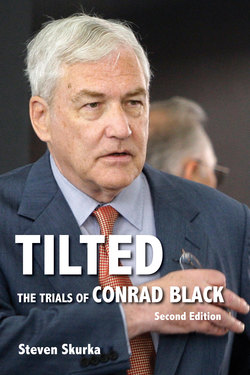Читать книгу Tilted - Steven Skurka - Страница 5
На сайте Литреса книга снята с продажи.
Foreword
ОглавлениеI often have the privilege of commenting for international television, radio networks, and print media, including the wire services, about high-profile criminal and civil corporate fraud cases, capital markets regulatory issues, and corporate governance. Media commentary comes with tremendous responsibility, to bring experience and shed light on the dynamics of the cases and the issues, and ensure that the public is correctly informed. The perspective that the media invites me to bring is 26 years practising law as a former Securities and Exchange Commission enforcement lawyer, a former state criminal prosecutor, a former United States federal criminal prosecutor, and as a defence lawyer and advisor to corporations and their officials. So, the Conrad Black case perfectly fit the profile of another such opportunity for commentary for my friends in the Canadian media in particular, with whom I also have discussed Enron, WorldCom, Lucent, Bernie Madoff, Alan Stanford, insider trading, international investigations, public corruption, and more. Little did I know at the time that I would meet and become friends with a prominent, articulate, successful, and quick-witted Canadian criminal defence lawyer, Steve Skurka, with whom I came to share many a microphone and printed page as the fate of Conrad Black and his C-Suite colleagues at Hollinger International wound its way into and along the roller coaster of the United States federal courts.
When Steve and I first met in person in Toronto during one of my periodic trips to Canada to speak at a securities law conference, he gave me a copy of the first edition of Tilted: The Trial of Conrad Black. Over the years, I have started to read books about various criminal trials, and typically put them away unfinished, as they were little more than a comprehensive but lifeless diary of a case. I found reading Tilted just the opposite — not only an entertaining and informative read, but a most insightful critique of the American federal criminal justice system. In fact, I have come to highly recommend this book to many American and international lawyer colleagues and non-lawyers to gain a valuable and different perspective on the American justice system and the criminalization of corporate misconduct in America. Just as important, Steve brings to life the relevance and dynamics of a trial that captivated Canada and the United Kingdom, but, to the frustration of Conrad Black, was a non-event in the United States. To this day I still wonder whether the championship game of the Canadian Football League had a greater real-time following in the United States than the Conrad Black trial outside of Chicago. Nevertheless, Steve’s close following of and ability to humanize and retell the case reflects that we “south of the border” missed a fascinating drama while it played out.
A number of times, while commenting for Canadian television on the case, I asked a producer to permit me to correct misinformation provided by another commentator. That never happened when I shared a segment with Steve. While Steve and I may not always have agreed on the approaches adopted by the attorneys or our expectations as the case worked through the appellate process, Steve’s analysis of the goings-on in court and the dynamics of the case always were well thought through, with fully supportable and justifiable strategies and outcomes. And, where I always limited my commentary to an arm’s-length perspective of a former prosecutor and a defence lawyer, Steve was up close and personal with all the parties and the lawyers. Steve watched critical motions and the trial day-in and day-out, ran through his mind the analysis of what might he have done differently and why, and observed first-hand the reactions of the judge, lawyers, defendants, and the jury. This provides a rare and valuable perspective on a criminal case that most outside the United States questioned as to the existence of criminality, and those inside the United States recognized as the further over-extension of a legal theory of corporate boardroom prosecutions that the United States Supreme Court ultimately rejected.
For me, as an American lawyer and commentator, there are several facts that are undisputable about the case. Twelve American citizens heard all of the evidence and convicted Conrad Black on several, albeit not all, charges. The judge who presided over the trial upheld the conviction. So too did the first level appellate court with a stinging opinion by one of America’s preeminent jurists. Benefiting from the United States Supreme Court’s displeasure with federal prosecutors’ misapplication of the deprivation of honest services statute under federal criminal law in the corporate prosecution and conviction of Jeffrey Skilling, Enron’s Chief Executive Officer, Conrad Black received a second chance in the courts. Although the first level appellate court ultimately threw out two more charges, Conrad Black remained a convicted felon, and the trial judge sent him back to jail to complete a reduced sentence. Steve superbly and clearly walks you through each step of the trial and the appellate process.
Regardless of whether you agree or disagree with the charges and the outcome, whether you are or are not a Conrad Black fan, and whether you believe Conrad Black deserved to sit twice in an American jail, you will find Steve’s book a most satisfying read. You will smile at Steve’s humour and dry wit. You will share outrage in his perceived excesses and injustices in the American judicial system. And, you may even come to understand why American prosecutors investigated and tried Conrad Black and his confidantes. After reading this book you will come away with a thorough understanding of the Conrad Black case, and considerable food for thought about the federal criminal justice system in the United States.
Jacob S. Frenkel
Chair, Securities Enforcement, White-Collar Crime
and Government Investigations Practice
Shulman, Rogers, Gandal, Pordy & Ecker, P.A.
